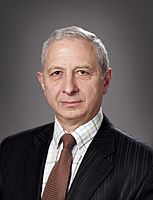Gerdzhikov Government facts for kids
Quick facts for kids Gerdzhikov Government |
|
|---|---|
92nd Cabinet of Bulgaria |
|
| 27 January 2017–4 May 2017 | |
 |
|
| Date formed | 27 January 2017 |
| Date dissolved | 4 May 2017 |
| People and organisations | |
| President | Rumen Radev |
| Prime Minister | Ognyan Gerdzhikov |
| No. of ministers | 20 |
| Member party | Independents |
| Status in legislature | Provisional Government |
| History | |
| Predecessor | Second Borisov Government |
| Successor | Third Borisov Government |
The Gerdzhikov Government was a temporary government in Bulgaria. It started on January 27, 2017, and finished on May 4, 2017. This government was put in place after the previous one, led by Prime Minister Borisov, stepped down. Its main job was to manage the country until new leaders could be chosen in the parliamentary elections on March 26, 2017.
Contents
What is a Government Cabinet?
A government cabinet is like a team of important people who help the country's leader, the Prime Minister, run things. Each person in the cabinet, called a minister, is in charge of a specific area. For example, there's a minister for education, a minister for health, and a minister for finance.
Why Was This Government Formed?
Sometimes, a government might step down before its term is over. When this happens, a temporary, or "caretaker," government is formed. This temporary team makes sure the country keeps running smoothly. Their main task is to prepare for new elections so that citizens can choose their next leaders. The Gerdzhikov Government was one such temporary team.
Who Led the Gerdzhikov Government?
The leader of this temporary government was Ognyan Gerdzhikov. He was the Prime Minister. The cabinet also included several Deputy Prime Ministers and other ministers. These ministers were chosen because they were independent, meaning they didn't belong to a specific political party. This helped them focus on their temporary job of preparing for the elections.
Key Roles in the Cabinet
The Gerdzhikov Government had ministers for many important areas. Some of these included:
- Deputy Prime Ministers: These individuals helped the Prime Minister with big tasks, like social policy, security, and managing money from the European Union.
- Minister of Interior: This person was in charge of keeping the country safe and maintaining law and order.
- Minister of Finance: This minister managed the country's money, including taxes and spending.
- Foreign Minister: This person handled Bulgaria's relationships with other countries around the world.
- Minister of Education: This minister was responsible for schools and learning.
- Minister of Defence: This person looked after the country's military and protection.
Each minister worked to keep their part of the government working well during this temporary period.
Images for kids
 | Calvin Brent |
 | Walter T. Bailey |
 | Martha Cassell Thompson |
 | Alberta Jeannette Cassell |



